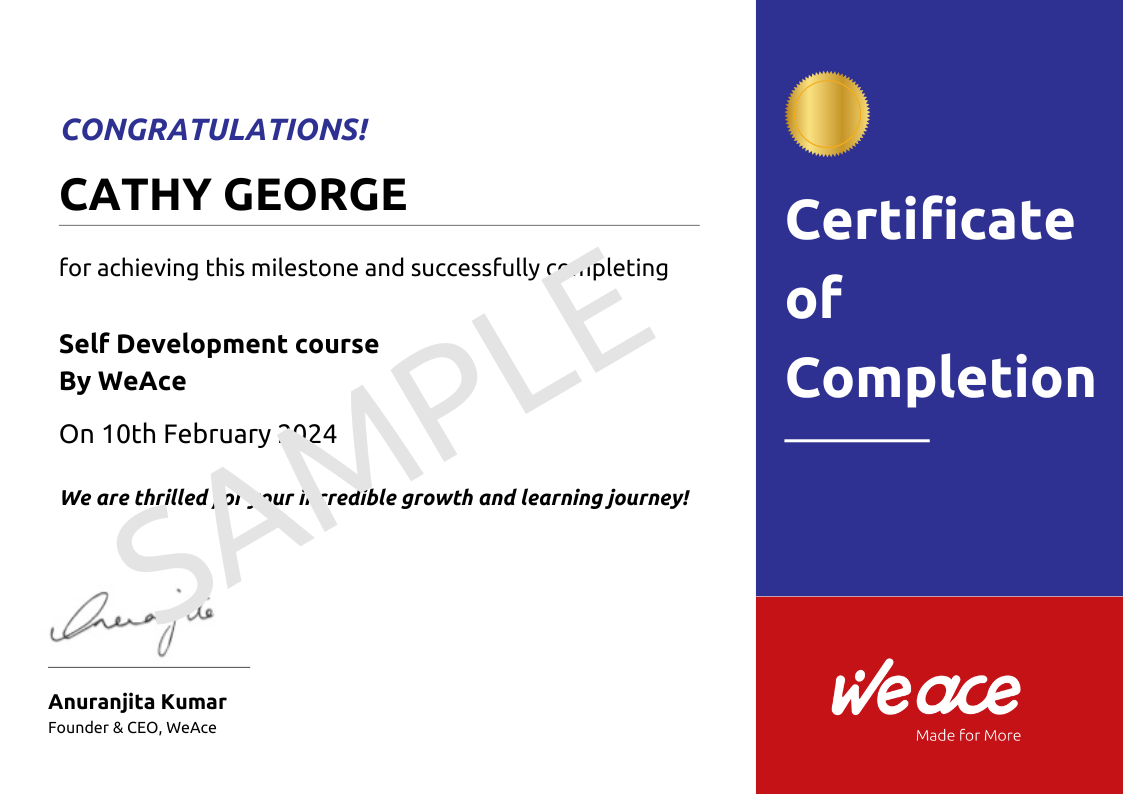Course Details
This is a half-day program for a batch size of 30 professionals.
A session on conflict resolution can provide numerous benefits, both personally and professionally. Here’s a detailed look at why you should consider attending such a session:
1. Understanding Conflict Dynamics
- Root Causes: Learn about the underlying causes of conflicts, which can range from personal differences and communication breakdowns to systemic issues within organizations.
- Types of Conflict: Differentiate between various types of conflict such as interpersonal, intrapersonal, organizational, and intergroup conflicts.
2. Developing Effective Communication Skills
- Active Listening: Enhance your ability to listen actively, understand others’ perspectives, and validate their feelings.
- Nonverbal Communication: Recognize the role of body language, tone of voice, and other nonverbal cues in conflict situations.
- Assertiveness: Learn how to express your thoughts and needs confidently without being aggressive.
3. Enhancing Problem-Solving Abilities
- Identifying Solutions: Develop skills to identify mutually beneficial solutions and create win-win situations.
- Negotiation Techniques: Gain insights into negotiation strategies that can help resolve conflicts amicably.
- Decision-Making: Improve your ability to make fair and effective decisions during conflicts.
4. Building Stronger Relationships
- Trust and Respect: Understand how to build and maintain trust and respect, which are crucial for resolving conflicts and strengthening relationships.
- Empathy: Cultivate empathy to better understand and relate to others’ emotions and viewpoints.
5. Reducing Stress and Anxiety
- Stress Management: Learn techniques to manage stress and maintain calm during conflicts.
- Emotional Regulation: Develop skills to regulate your emotions and respond to conflicts rationally.
6. Improving Workplace Environment
- Team Collaboration: Enhance teamwork and collaboration by resolving conflicts effectively.
- Productivity: Reduce disruptions caused by conflicts, leading to increased productivity and a more harmonious work environment.
- Leadership Skills: Equip leaders with the skills to manage and resolve conflicts within their teams.
7. Personal Growth and Development
- Self-Awareness: Increase your self-awareness and understand your conflict resolution style.
- Personal Accountability: Learn to take responsibility for your role in conflicts and work towards personal improvement.
- Adaptability: Become more adaptable and resilient in the face of conflicts.
8. Legal and Ethical Considerations
- Conflict of Interest: Understand how to navigate conflicts of interest in a professional setting.
- Ethical Decision-Making: Learn to make decisions that are ethically sound and fair to all parties involved.
9. Practical Tools and Techniques
- Conflict Resolution Models: Familiarize yourself with various conflict resolution models and frameworks, such as the Thomas-Kilmann Conflict Mode Instrument (TKI) or the Interest-Based Relational (IBR) approach.
- Role-Playing and Simulations: Engage in role-playing exercises and simulations to practice and refine your conflict resolution skills.
10. Networking Opportunities
- Peer Learning: Share experiences and learn from peers facing similar challenges.
- Professional Connections: Build a network of professionals skilled in conflict resolution, which can be valuable for future collaborations and support.
Conclusion
Attending a conflict resolution session can provide you with essential skills and knowledge to manage and resolve conflicts effectively. Whether you’re looking to improve your personal relationships, enhance your professional environment, or develop leadership skills, such sessions offer valuable insights and practical tools to navigate conflicts constructively.
For more information on pricing and registration, contact [email protected]
Program Structure
Introduction and Orientation
- Welcome and Icebreaker Activities: Brief activities to help participants get to know each other and feel comfortable.
- Program Overview: Introduction to the session's goals, agenda, and expected outcomes.
- Setting Ground Rules: Establishing guidelines for respectful communication and participation.
2. Understanding Conflict
- Definition and Types of Conflict: Overview of what conflict is and the different types (interpersonal, intrapersonal, organizational, intergroup).
- Causes of Conflict: Exploring common causes such as miscommunication, differing values, and interests.
- Conflict Dynamics: Understanding how conflicts escalate and de-escalate.
3. Self-Awareness and Personal Reflection
- Conflict Styles Assessment: Using tools like the Thomas-Kilmann Conflict Mode Instrument (TKI) to identify participants' conflict resolution styles.
- Personal Reflection Exercises: Activities that encourage participants to reflect on their experiences with conflict and their responses.
4. Communication Skills
- Active Listening: Techniques and exercises to improve listening skills.
- Effective Communication: Strategies for clear, assertive, and respectful communication.
- Nonverbal Communication: Understanding the impact of body language and tone of voice.
5. Conflict Resolution Strategies
- Problem-Solving Models: Introduction to various conflict resolution models (e.g., Interest-Based Relational (IBR) approach).
- Negotiation Techniques: Basic principles of negotiation and finding win-win solutions.
- Mediation Skills: Overview of mediation processes and how to facilitate mediation.
6. Practical Application and Role-Playing
- Case Studies: Analysis of real-life conflict scenarios to apply learned concepts.
- Role-Playing Exercises: Simulated conflict situations where participants can practice resolution techniques.
- Group Discussions: Debriefing role-play exercises and discussing different approaches and outcomes.
7. Emotional Intelligence and Stress Management
- Emotional Regulation: Techniques for managing emotions during conflict.
- Empathy Development: Exercises to enhance empathy and understanding of others' perspectives.
- Stress Management: Strategies for reducing stress and maintaining composure in conflict situations.
8. Building Collaborative Relationships
- Trust and Respect: Strategies for building and maintaining trust and respect in relationships.
- Team Collaboration: Enhancing teamwork and collaboration through effective conflict resolution.
9. Ethical and Legal Considerations
- Ethical Decision-Making: Discussing the importance of ethics in conflict resolution.
- Navigating Conflicts of Interest: Understanding and managing conflicts of interest in professional settings.
10. Action Planning and Follow-Up
- Personal Action Plan: Participants create an action plan to apply conflict resolution skills in their personal and professional lives.
- Follow-Up Activities: Suggestions for ongoing practice and development, such as reading materials, online courses, and peer support groups.
11. Evaluation and Feedback
- Participant Feedback: Collecting feedback to assess the effectiveness of the program and identify areas for improvement.
- Program Evaluation: Reviewing the outcomes and impact of the program to ensure continuous improvement.
Additional Elements
- Guest Speakers: Experts in conflict resolution sharing their insights and experiences.
- Resource Materials: Providing participants with handouts, books, and online resources for further learning.
- Certification: Offering a certificate of completion to participants who successfully complete the program.
Get your certificate of completion

-
DURATION 3 Hour(s)
-
LEVEL Entry Level (0-2 years), Junior Level (2-7 years), Mid Level (8-15 years), Senior Level (15+ years)
-
FORMAT Online Instructor Led
-
CERTIFICATION Yes
-
Academy Leadership & Management
-
Topics Problem solving, Flexibility, Strategic thinking
-
KEY LEARNING AREA Upskilling, Sustainability, Conflict Resolution
-
SKILLS Conflict Resolution, Conflict Management
-
BEST FOR Working Professionals
-
TRAINER WeAce

/filters:strip_exif()/wocademy/images/logo/hq7RLC6ZMMNXVsCguBA5m71VUCsDkzZWBb0NVM98.jpg)
 Led
By: WeAce
Led
By: WeAce
 Online
Self
Paced
Online
Self
Paced
/filters:strip_exif()/wocademy/images/logo/dgGIhH3F9TM3rz9n4ozSkUAeOXVTQ56OuVEIwkoT.png)
/filters:strip_exif()/wocademy/images/logo/hlMXNEtJMOuQIObHUdG8cF0Vb7wncoAafFviDvIF.png)
/filters:strip_exif()/wocademy/images/logo/S6LLBeylE85oJHJ4AYlP1zpPQ2at0DXZWN2l79Rb.jpg)
/filters:strip_exif()/wocademy/images/logo/iP3oWtdU3xnyAm469mEEzxDngzdzSvly6WxB8hZD.png)
/filters:strip_exif()/wocademy/images/logo/FgIH1oXJUPc1Wp4EU1HGTdfuMxMtHnFCGMoGo7gY.jpg)
/filters:strip_exif()/wocademy/images/logo/PPbcYaKchvGDAVe5c0MxCb5d8XdhyfQU1rxoJI8f.png)
/filters:strip_exif()/wocademy/images/logo/Pn8iJh2ENt1Eig1B53qi8FoKR6yIVEJjZp1uK1HR.png)